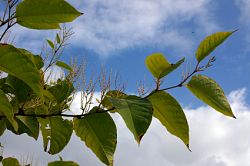

The Court of Appeal has ruled against Network Rail in appeal against damages to be given to two homeowners in Maesteg, Wales, in a case where the homeowners were seeking compensation due to the presence of Japanese knotweed.
Japanese knotweed is considered as an invasive, non-native plant and its growth is controlled under the Wildlife and Countryside Act 1981.
The homes of Stephen Williams and Robin Waistell are adjacent to land owned by Network Rail, which is rife with Japanese knotweed. The pair originally won a case against Network Rail at the beginning of 2017, claiming the weed had devalued their homes. It can also be very expensive to treat and remove and can cause some damage to homes.
Although Network Rail appealed, their efforts failed, and £15,000 was paid to Mr Waistell, although this was not for the loss of value to the homes. This ruling now allows other homeowners to pursue compensation through the courts against Japanese knotweed.
Master of the Rolls Sir Terence Etherton said, "Japanese knotweed, and its roots and rhizomes, does not merely carry the risk of future physical damage to buildings, structures and installations on the land.
"Its presence imposes an immediate burden on landowners who face an increased difficulty in their ability to develop, and in the cost of developing, their land, should they wish to do so, because of the difficulties and expense of eradicating Japanese knotweed from affected land.
Rodger Burnett, the lawyer acting on behalf of Mr Waistell, said, "This is a great result for Mr Waistell and homeowners up and down the country. Hopefully now organisations like Network Rail will take their responsibilities seriously and remove the knotweed on their properties."